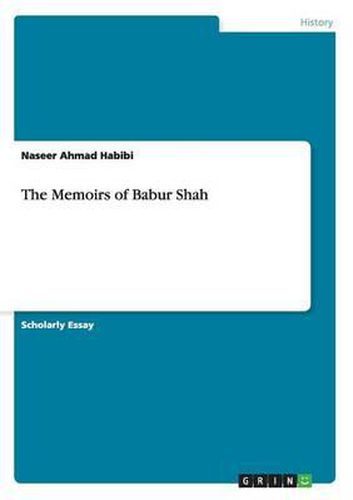Readings Newsletter
Become a Readings Member to make your shopping experience even easier.
Sign in or sign up for free!
You’re not far away from qualifying for FREE standard shipping within Australia
You’ve qualified for FREE standard shipping within Australia
The cart is loading…






Scientific Essay from the year 2012 in the subject History - Asia, grade: A, American University of Central Asia, course: History of Kyrgyzstan, language: English, abstract: The -Memoirs of Babur- or Baburnama are the work of the great-great-great-grandson of Timur (Tamerlane), Zahiruddin Muhammad Babur (1483-1530). As their most recent translator declares, -said to ‘rank with the Confessions of St. Augustine and Rousseau, and the memoirs of Gibbon and Newton, ’ Babur’s memoirs are the first–and until relatively recent times, the only–true autobiography in Islamic literature.- The Baburnama tells the tale of the prince’s struggle first to assert and defend his claim to the throne of Samarkand and the region of the Fergana Valley. After being driven out of Samarkand in 1501 by the Uzbek Shaibanids, he ultimately sought greener pastures, first in Kabul and then in northern India, where his descendants were the Moghul (Mughal) dynasty ruling in Delhi until 1858.
$9.00 standard shipping within Australia
FREE standard shipping within Australia for orders over $100.00
Express & International shipping calculated at checkout
Scientific Essay from the year 2012 in the subject History - Asia, grade: A, American University of Central Asia, course: History of Kyrgyzstan, language: English, abstract: The -Memoirs of Babur- or Baburnama are the work of the great-great-great-grandson of Timur (Tamerlane), Zahiruddin Muhammad Babur (1483-1530). As their most recent translator declares, -said to ‘rank with the Confessions of St. Augustine and Rousseau, and the memoirs of Gibbon and Newton, ’ Babur’s memoirs are the first–and until relatively recent times, the only–true autobiography in Islamic literature.- The Baburnama tells the tale of the prince’s struggle first to assert and defend his claim to the throne of Samarkand and the region of the Fergana Valley. After being driven out of Samarkand in 1501 by the Uzbek Shaibanids, he ultimately sought greener pastures, first in Kabul and then in northern India, where his descendants were the Moghul (Mughal) dynasty ruling in Delhi until 1858.